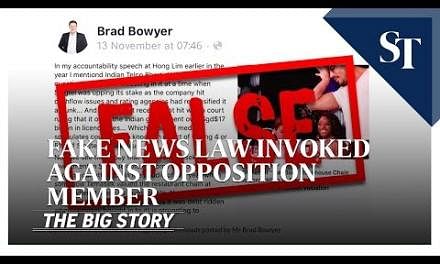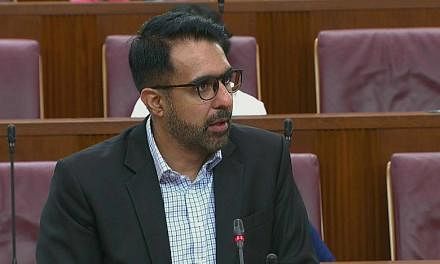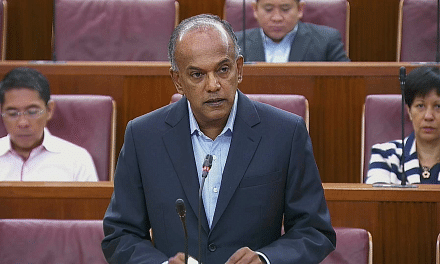SINGAPORE - Technology companies in Singapore will be required to abide by codes of practice in a proposed fake news law to prevent their platforms from being used to spread falsehoods.
The codes have three aims: To prevent and counter the misuse of online accounts by malicious actors who can hide behind them by being anonymous; to enhance the transparency of political advertising; and to downplay online falsehoods, said Communications and Information Minister S. Iswaran in Parliament on Wednesday (May 8).
Tackling these issues upstream, apart from the draft law's measures such as corrections and take-down orders, are necessary to help ensure a safer online environment, Mr Iswaran added when speaking at the debate on the Protection from Online Falsehoods and Manipulation Bill.
"The more we can work with technology companies on such upstream systems and processes, the less we will need to issue corrections or take-down directions downstream," he told the House.
Under the draft law's codes of practice, Internet intermediaries like social media platforms have to use reasonable verification measures to prevent fake accounts or bots from being created or used for malicious activities, he said.
The tech firms also have to ensure that political advertisements disclose who is the source. "This encompasses election advertising and advertisements on issues of public interest or controversy in the Singapore context, including those pertaining to race or religion," he added.
Mr Iswaran also said that requiring Internet intermediaries to de-prioritise online fake news will ensure credible content is given prominence and falsehoods are prevented from gaining prominence.
He noted that the scope of these codes takes reference from international norms, including the EU Code of Practice on Disinformation, as well as consultations with companies and world experts.
To implement the proposed measures, a Protection from Online Falsehoods and Manipulation Act (POFMA) Office is being planned.
It will be set up in the Infocomm Media Development Authority and will work with the tech companies on the codes of practice.
Mr Iswaran said the implementation of the codes will be "targeted and graduated", and the focus is on ensuring the tech companies have adequate systems and processes in place.
Where breaches occur, the POFMA Office will consider factors such as the seriousness of the breach, whether it reflects a systemic deficiency and if the companies' efforts to remedy the problems are adequate.
Noting that tech companies are an important part of Singapore's business ecosystem and digital economy, he said the POFMA Office will work with the firms to develop company-specific annexes to the codes.
"These annexes will clarify how each (Internet) intermediary will operationalise the broad outcomes, principles and objectives in the codes, taking into account the unique features of each intermediary's platform, its existing systems and measures to combat disinformation, technical capabilities as well as effectiveness," he said.
In his 30-minute speech, Mr Iswaran also touched on the non-legislative measures needed to combat online falsehoods, like initiatives to build up media literacy, as well as the need for a "calibrated set of measures" to deal with the swift spread of online falsehoods.
He also spelt out the scope of powers which ministers will have under the new law. Portfolio ministers can, for example, ask for corrections on online falsehoods, but powers to block funding and access to online locations are in the hands of only the communications and information minister.
The reason is that "these decisions have broader implications - beyond individual ministries - for internet users, the industry and the digital infrastructure", he added.
Mr Iswaran said the POFMA Office will support the portfolio ministers with technical advice on the precedents, the types of levers available, their feasibility and effectiveness. This will provide consistency across the Government in the implementation of the Bill, he added.














